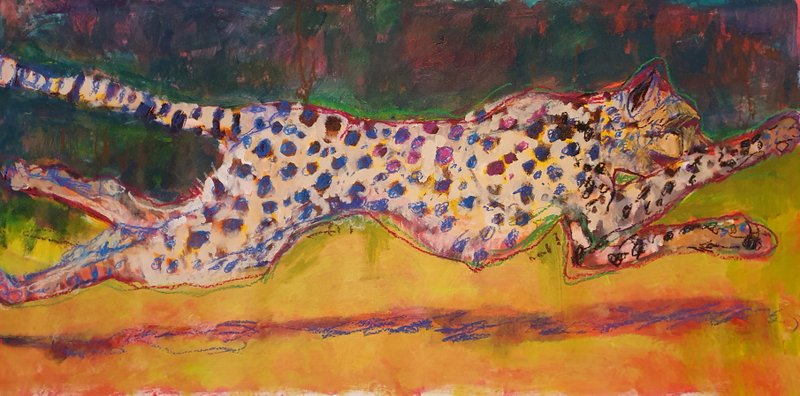Cafe des Nattes M. Blair Pessemier Oil on canvas 18 x 24"
Artnotes: Communication
I made my first dog biscuit sales this week, to two ladies in the park. The dogs are mad for the biscuits, jumping feet in the air at the sight of me. Harika, of course, is not keen on sharing her mistress nor her biscuits, but we’re working on it. I get the news from the ladies there – whether it’s who Mr. A is running around with or what the park hours will change to next week. Harika loves Voltaire, the Tunisian dog who comes to the park, and she jumps around and over him, bumping noses, as we speak to his owner. She’s not sure about this Tunisian revolution, and I realize as a mature home owner there, she doesn’t want to rock the boat.
I’ve been on computer all week, making dog biscuit labels (it turns out there is a sort of moon pie sold in Turkey, called, like mine, Harika Biscuit). I’ve been answering questions about the painting tour we’re offering later in the year. I’ve made brochures, and a couple of web pages along the lines of the tour.
This, and monitoring Facebook. I have really felt a part of the Tunisian revolution through Facebook. I was ecstatic to be receiving current news, straight from the cellphone video. I think it really helped that people there, the revolutionaries, could get their story out, despite state censorship. And the positive vibrations, hope and encouragement sent back was appreciated.
One of my most vivid memories of Tunisia was on a first trip, in early 2007: a friend asked we not speak about the government in her car, at the café, or anyplace we could be seen or heard. I recall thinking, at the time, that she was paranoid, We walked through the souk that day, and later, out in the Kasbah, amidst lots of “white noise”, we spoke. Simply, there was no freedom.
When we moved to Tunisia later that year, it was clear there were many limitations. I had a terrible time getting my Internet hooked up, and when I did, it only worked sporadically. I used to go to the US embassy to send out Artnotes, until they confiscated my flash drive. While working in the library, I met a man who worked in Internet security for the Tunisian government. “So it’s you who read my emails,” I quipped. “Yes,” he replied, with a completely serious face. Everything I ever wrote was news at the listening post.
LaPresse was the Tunisian newspaper, heavily censored (probably owned) by the Ben Ali regime. All was good news, but whether it was exactly true was uncertain. When there were floods in the streets of Tunis, no reporting. So the people network was what counted there: men in coffee shops, women over the back fence, at the hairdresser or hammam. Facebook increased that people network.
With Facebook, I was able to keep up with news and conditions there even better than on Aljazeera. I read a variety of online papers to get the news: NYTimes, Drudgereport, leParisien and LeFigaro or LeMonde, and Aljazeera. If I’m really stuck I’ll try BBC or Independent. It was Aljazeera who made the first announcement that Ben Ali was gone, followed 20 minutes later by the NYTimes. I learned it five minutes before either. And yes, I’ve gone to Wi k ileaks, to learn more about what was going on, and certain hypotheses I had were in fact, correct. Wikile aks bore out the fact Ben Ali was clearly responsible for autrocities and flagrant corruption in a country where the average monthly salary is less than $500.00.
The opportunity to share information worldwide is perhaps the best invention of my lifetime so far (Blair’s grandmother used to say for her, it was the radio). I hope it stays as free and open as it is now.
Harika, who has been barking for the last four weeks, has mysteriously stopped. She’s been sleeping heavily since the news that her native country, Tunisia, is in on its way to Independence.

